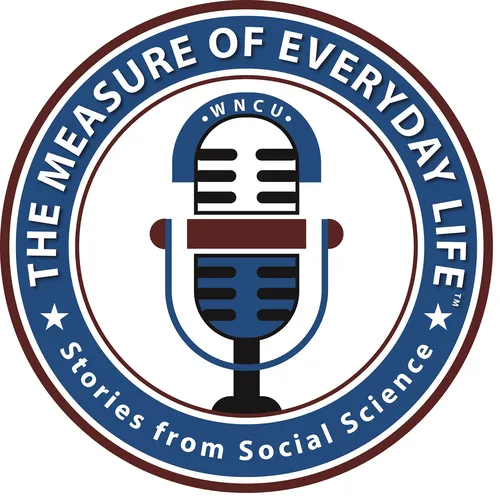
The Measure of Everyday Life
Interested in human behavior and how people think? The Measure of Everyday Life explores ideas about how we live and why people act as they do. Independent Weekly has called the show "unexpected" and "diverse" and says the show "brings big questions to radio." Join host Dr. Brian Southwell (@BrianSouthwell) as he explores the human condition.
Episodes air each Sunday night at 6:30 PM in the Raleigh-Durham broadcast market and a podcast of each show is available online the Wednesday following. The show is made possible by RTI International.
- Update frequency
- every 10 days
- Average duration
- 29 minutes
- Episodes
- 103
- Years Active
- 2021 - 2025

Healthcare and Humanism
Our healthcare system comprises people -- including patients who need help and healthcare professionals who help them -- and yet our discussions about healthcare in the U.S. often focus on abstract c…

Emotion as Public Opinion
We have been making progress in incorporating emotional responses into measures of public perceptions to predict behavior. On this episode, we talk with Tomas Gonsorcik, Global Chief Strategy Officer…

Personal Data and Society
Whenever we use the Internet, we potentially share personal data in exchange for information that can, in turn, shape future information presented to us. What are the implications of that arrangement…

Communication for Suicide Prevention
How we talk about suicide matters. How we talk about prevention and support also matters. On this episode, we talk with Aurora Occa of the University of Kentucky about her work to help college studen…

Kindness in Healthcare
We hear often hear about stress and burnout in healthcare. We don’t hear as often about kindness. What roles could kindness play in the future of our healthcare system? On this episode, we talk with …

Parenting amidst Algorithms
How to be a good parent has been a topic of conversation for decades but raising children now includes online influences as well. How is the Internet shaping how we think about parenting? On this epi…

Improving Trust in Online Interactions
Even as people use online technologies in their everyday lives, they sometimes worry about potential pitfalls, including concerns about trusting other people. On this episode, we talk with two innova…

Neuroscience and Mysticism
As we seek to know ourselves, who should help us with that exploration? Many different perspectives on empirical research, philosophy, and contemplation can be helpful as we try to understand our mi…

Improving Local Public Health through New Technologies
Local public health workers help communities all over the country. Who helps them do their work? On this episode, we talk with two people who have spent time supporting public health in Western North…

Challenging Mental Health Stigma
How should we support people facing mental health challenges? The Ad Council -- the same organization which introduced us to Smokey Bear over 80 years ago -- has some answers with their latest eviden…

Student Use of Artificial Intelligence Tools
Artificial intelligence tools have been in the headlines and yet we are still learning who opts to use such tools and why. On this episode, we talk with David Playfoot of Swansea University in the Un…

Teen Perceptions of Artificial Intelligence and Online Content
As online content evolves, you might assume teenagers are flourishing on the Internet while older Americans shake their head in confusion, but the reality might surprise you. On this episode, we tal…

Online Classes and Social Presence
The growth of online courses has been an important part of the story of education in the United States in the past decade, but we need more evidence of the ways our shift online may affect our sense …

Adults Who Reported Past Life Memories as Children
On this episode, Marieta Pehlivanova of the University of Virginia returns to the show to discuss her neurological perception research, including the adult experiences of people who as children repor…

Reducing Social Exclusion among Children
Helping children make friends with a wide range of people can benefit us all. On this episode, we talk with Melanie Killen of the University of Maryland, a psychology professor who has studied ways t…

Measuring the Health and Diet of Americans
What do Americans eat? What do we know about their overall health? Answering questions like those requires measurement on a national scale. For decades, the U.S. Centers for Disease Control and Prev…

Civic Leadership and Aging
Article 2 of the U.S. Constitution sets an age limit for people running for various offices but we do not have an upper age limit. What do Americans think about aging and civic life? On this episode,…

Cognitive Behavioral Therapy and Crime
Crime rates in the United States are generally lower now than they were a few decades ago and yet researchers and criminal justice professionals continue to search for innovations to reduce rates of …

Suicide Prevention and Native American Communities
On this episode, we lift up the work of three researchers who are making a difference through their efforts to promote suicide prevention among Native American people: Ivette Rodriguez Borja, Rebecca…

Climate Change and Food Marketing
When we read about the devastating effects of weather-related disasters, we often focus on housing and infrastructure. Such situations also might affect our eating patterns. On this episode, we talk …